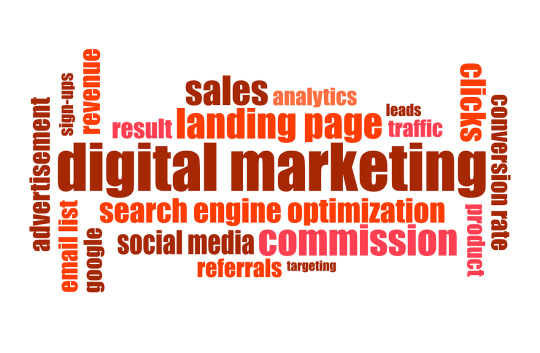Don't wanna be here? Send us removal request.
Text
Influencer Marketing vs Affiliate Marketing: Which is Right for Your Brand?

Introduction
Both influencer marketing and affiliate marketing are two key types of social media marketing for brands to reach new audiences and drive sales. However, they have distinct differences in approach, benefits, and suitability for different brands.
Influencer Marketing
Influencer marketing involves partnering with individuals who have a large following on social media or other online platforms. These influencers promote your brand, products, or services to their audience, often through sponsored content, product reviews, or tutorials.
Pros:
Cons:
Get The best Social Media Marketing Services Today
Affiliate Marketing:
Affiliate marketing involves partnering with affiliates who promote your brand, products, or services in exchange for a commission on sales or referrals generated through their unique affiliate link.
Pros:
Cons:
Which is Right for Your Brand?
Consider the following factors to decide between influencer marketing and affiliate marketing:
Ultimately, both influencer marketing and affiliate marketing can be effective strategies for your brand. Consider your goals, budget, and niche to decide which approach is right for you.
Get great digital marketing services in affordable prices today
Types of Social Media Marketing
Your search for a better social media marketing strategy just does not over here. Here are some more types of social media marketing
Influencer Marketing
Influencer marketing, also known as affiliate marketing, involves partnering with industry experts and social media influencers to promote products or services to their audience.
Social Media Management
Social media management involves managing and maintaining a brand's social media presence, including creating and scheduling posts, responding to comments, and analyzing engagement metrics.
Paid Media Marketing
Paid media marketing involves using paid social media ads to reach a targeted audience and drive website traffic, leads, or sales.
Social Media Content Marketing
Social media content marketing involves creating and sharing valuable, relevant, and consistent content on social media platforms to attract and retain a clearly defined audience.
Social Media Engagement Marketing
Social media engagement marketing involves interacting with followers, responding to comments and messages, and building a community on social media platforms.
Live Streaming Marketing
Live streaming marketing involves broadcasting live video content on social media platforms to engage with followers, increase brand awareness, and drive website traffic.
Social Media Customer Service
Social media customer service involves using social media platforms to provide customer support, respond to customer inquiries, and resolve customer complaints.
Social Media Analytics and Reporting
Social media analytics and reporting involve tracking and measuring the performance of social media marketing campaigns, and using that data to inform marketing strategies.
Affiliate Marketing
A performance-based marketing model where an affiliate earns commissions by promoting a product or service from a merchant, and earns a commission for each sale, referral, or lead generated through their unique affiliate link.
Conclusion:
Influencer marketing and affiliate marketing are both effective strategies for reaching new audiences and driving sales. However, they have distinct differences in approach, benefits, and suitability for different brands. By understanding your brand goals, budget, and niche, you can decide which strategy is right for you.
Summary:
By weighing the pros and cons of each strategy, you can make an informed decision and create a marketing plan that drives real results for your brand.
#digital marketing#social media#smm services#influencer marketing#digital marketing agency#affilate marketing#instagram marketing
1 note
·
View note
Text
The Ultimate Guide to Search Engine Optimization (SEO) in 2024

Introduction to SEO in 2024
In 2024, Search Engine Optimization (SEO) continues to evolve, driven by advancements in artificial intelligence, machine learning, and user experience enhancements. As search engines become more sophisticated, SEO strategies must adapt to prioritize high-quality, relevant content, and seamless user interactions. Key trends include the growing importance of voice search, mobile-first indexing, and Core Web Vitals metrics that assess site performance and user satisfaction. Understanding these changes and implementing modern SEO practices is crucial for businesses aiming to improve their online visibility and stay competitive in an increasingly digital marketplace.
Latest SEO Trends and Updates
In 2024, SEO trends and updates are heavily influenced by AI and machine learning, which enable search engines to better understand user intent and context, delivering more accurate results. Voice search continues to rise, driven by the proliferation of smart devices, necessitating optimization for natural language queries. Mobile-first indexing remains a priority as Google emphasizes mobile-friendly websites, ensuring they are optimized for mobile users. Core Web Vitals, including metrics like loading speed, interactivity, and visual stability, are crucial for evaluating user experience, making it essential for websites to meet these performance standards to rank higher in search results.
Keyword Research and Analysis
In 2024, keyword research and analysis require advanced techniques to stay competitive. Leveraging AI-powered tools and software, marketers can uncover valuable insights into search patterns and user behavior. Effective keyword analysis involves using platforms like SEMrush, Ahrefs, and Google’s Keyword Planner to identify high-impact keywords. Emphasizing long-tail keywords, which are more specific and less competitive, can drive targeted traffic, while short-tail keywords help in gaining broader visibility. Balancing both types enhances SEO strategies, ensuring content reaches the right audience at different stages of the buying journey, ultimately boosting search engine rankings and conversion rates.
GET BEST DIGITAL MARKETING SERVICES TODAY
On-Page SEO Best Practices
On-page SEO in 2024 focuses on optimizing individual web pages to rank higher and earn more relevant traffic. Key practices include crafting high-quality, engaging content enriched with targeted keywords naturally integrated into titles, headers, and body text. Proper use of meta tags, such as meta descriptions and title tags, helps search engines understand page content. Structured data and schema markup improve search result visibility with rich snippets. Optimizing images with alt text, and ensuring fast loading times, mobile-friendliness, and clear site navigation enhances user experience. Regularly updating content to keep it relevant also plays a crucial role in on-page SEO success.
Off-Page SEO Strategies
Off-page SEO in 2024 emphasizes building a strong online presence and authority through external efforts. Key strategies include earning high-quality backlinks from reputable websites, which signal trust and relevance to search engines. Engaging in guest blogging on industry-related sites and collaborating with influencers amplify reach and credibility. Social signals, such as shares, likes, and comments on social media platforms, also play a crucial role in enhancing visibility and driving traffic. Additionally, participating in online communities and forums to provide valuable insights and establishing brand mentions without direct links further boost off-page SEO, contributing to higher search engine rankings and organic growth.
Technical SEO
Technical SEO in 2024 focuses on optimizing website infrastructure to enhance crawlability, indexability, and user experience. Key elements include ensuring a clean and efficient site architecture with a logical hierarchy and effective internal linking. Optimizing page speed through techniques like image compression, browser caching, and minimizing code is essential for performance. Implementing secure HTTPS protocols and creating comprehensive XML sitemaps improve site accessibility. Addressing crawl errors, optimizing for mobile devices, and using structured data markup help search engines understand content better. Regular audits and maintenance of these technical aspects ensure a website remains robust, user-friendly, and primed for high search engine rankings.
Local SEO Tips
Local SEO in 2024 focuses on enhancing online visibility for businesses within specific geographic areas. Optimizing your Google My Business (GMB) profile is essential, including accurate contact information, operating hours, and engaging multimedia. Encouraging satisfied customers to leave positive reviews enhances credibility and local rankings. Consistent NAP (Name, Address, Phone number) citations across all directories prevent confusion and boost search engine trust. Leveraging local keywords in your content, meta tags, and URL structures targets nearby customers effectively. Participating in local events and community engagements, and earning local backlinks further strengthens your local SEO efforts, driving more foot traffic and local online visibility.
Search Engine Optimization Tools and Resources
SEO tools and resources in 2024 are vital for developing and executing effective SEO strategies. Popular tools like Ahrefs, SEMrush, and Moz offer comprehensive features for keyword research, site audits, backlink analysis, and competitor insights. Google Analytics and Search Console provide essential data on site performance and user behavior. For on-page optimization, tools like Yoast SEO and Surfer SEO guide content improvements. Leveraging these tools helps identify opportunities, track progress, and refine tactics. Additionally, resources such as SEO blogs, webinars, and online courses from platforms like HubSpot Academy and Coursera keep marketers updated on the latest trends and best practices.
Future Predictions for Search Engine Optimization
Future predictions for SEO indicate a continued evolution towards more sophisticated algorithms that prioritize user intent and experience. AI and machine learning will play an increasingly pivotal role in refining search results, necessitating adaptive SEO strategies. Voice search optimization will grow as smart devices become ubiquitous, requiring content tailored for natural language queries. The importance of mobile-first indexing and Core Web Vitals will persist, emphasizing fast, responsive, and user-friendly websites. As SEO becomes more integrated with broader digital strategies, such as AI-driven personalization and augmented reality, staying ahead will require agility, innovation, and a deep understanding of evolving consumer behaviors and technology trends.
Conclusion
In conclusion, navigating the intricacies of Search Engine Optimization (SEO) in 2024 demands a comprehensive understanding of evolving trends and best practices. This ultimate guide has illuminated key facets such as the integration of AI and machine learning, the impact of voice search, and the critical importance of mobile-first indexing and Core Web Vitals. By prioritizing advanced keyword research, optimizing on-page elements, and leveraging effective off-page strategies, businesses can enhance their online visibility and competitiveness. Furthermore, technical SEO remains foundational, ensuring websites are not only easily accessible but also provide seamless user experiences across devices. Embracing local SEO tactics and harnessing the power of analytics and SEO tools are crucial for maintaining relevance and achieving sustainable growth. As SEO continues to evolve alongside technological advancements and consumer behaviors, staying informed and adaptable will be essential for achieving and maintaining digital success in the years ahead.
#digital marketing#digital marketing agency#search engine optimization#seo#trending#tumblr#seo services#website#growth#marketing#business#services
1 note
·
View note
Text
Business Hive is a leading provider of professional and high-quality digital marketing services and products.It was founded on the belief that business can be done with a conscience, prioritizing the well-being of people and the planet alongside financial success. Business Hive offers the following services offers a range of services:
#digital marketing#digital marketing agency#search engine optimization#seo#trending#tumblr#social media#social marketing#smm services#smm#website design#website#websitecreation#graphic design
3 notes
·
View notes
Text

Unlocking the Future of Business: Your Ultimate Guide to Choosing the Right Digital Marketing Agency
Introduction
Digital marketing encompasses the use of online channels to promote products or services, reaching audiences through platforms like social media, search engines, email, and websites. It leverages various digital tools and strategies to engage with target demographics, drive traffic, and generate leads or sales. With its dynamic nature and vast reach, digital marketing has become essential for businesses aiming to thrive in the digital age. Let us begin to tell u about digital marketing agency.
#digital marketing agency#digital marketing#tumblr#tumblr stuff#search engine optimization#seo#busienss#trending
0 notes
Text
Top Digital Marketing Agency Insights Revealed

Unlocking the Future of Business: Your Ultimate Guide to Choosing the Right Digital Marketing Agency
Introduction
Digital marketing encompasses the use of online channels to promote products or services, reaching audiences through platforms like social media, search engines, email, and websites. It leverages various digital tools and strategies to engage with target demographics, drive traffic, and generate leads or sales. With its dynamic nature and vast reach, digital marketing has become essential for businesses aiming to thrive in the digital age. Let us begin to tell u about digital marketing agency.
To get advanced digital marketing services with 20% discount by clicking on this link

The Evolution of Digital Marketing Agency
Digital marketing agencies have evolved significantly since their inception, adapting to technological advancements and changing consumer behaviors. Initially focused on basic services like website design and email marketing, agencies now offer a comprehensive range of solutions. This includes social media management, search engine optimization (SEO), content marketing, pay-per-click (PPC) advertising, analytics, and more. The rise of data analytics and artificial intelligence has further transformed these agencies, enabling them to provide personalized, data-driven strategies. Additionally, the shift towards remote work and virtual collaboration has expanded their global reach, allowing them to serve clients across borders efficiently.
The Rise of Digital Media
The rise of digital media has revolutionized how information is consumed and shared. With the widespread adoption of smartphones, social media platforms, and streaming services, digital media has become ubiquitous. It offers instant access to news, entertainment, and communication, transcending geographical boundaries. The democratization of content creation has empowered individuals and businesses alike to produce and distribute content, fostering new forms of expression and engagement. Digital media’s influence continues to grow, reshaping industries and shaping cultural norms.
boost your business online presence
Adapting to Changing Consumer Behaviors
Digital marketing agencies aid businesses by understanding and leveraging consumer behavior online. They analyze data to identify target audiences, optimize campaigns for various platforms, and create engaging content tailored to each channel. By implementing strategies such as social media management, search engine optimization, and email marketing, agencies ensure brands remain visible and relevant in the digital landscape. Their expertise helps businesses adapt to evolving consumer preferences, ultimately driving engagement, loyalty, and sales.
What Makes a Top Digital Marketing Agency?
Strategic Approach
A top digital marketing agency exhibits a strategic mindset, aligning campaigns with client goals and target audience needs.
Expertise Across Channels
They possess deep knowledge and proficiency in various digital marketing channels, including social media, SEO, PPC, content marketing, and email marketing.
Data-Driven Decision-Making
Utilizing analytics tools, they make informed decisions based on data insights to optimize campaigns and maximize ROI.
Creativity and Innovation
They demonstrate creativity in content creation and campaign design, continuously innovating to capture audience attention and differentiate brands.
Transparent Communication
Clear and open communication ensures clients are informed about campaign performance, challenges, and opportunities.
Proven Track Record
A history of successful campaigns and satisfied clients showcases their ability to deliver results consistently.
Adaptability and Agility
They stay ahead of industry trends, adapting strategies quickly to keep pace with evolving consumer behaviors and technological advancements.
Expertise and Specialization
Having specialized skills in various aspects of digital marketing, including SEO, PPC, and social media, is crucial for several reasons:
Optimizing Performance
Each aspect of digital marketing requires specific techniques and strategies to achieve optimal performance. Specialized skills ensure that campaigns are effectively optimized to reach target audiences and deliver desired outcomes.
Maximizing ROI
By understanding the intricacies of SEO, PPC, and social media, marketers can maximize return on investment (ROI) by efficiently allocating resources and targeting the most relevant audiences.
Driving Traffic and Conversions
SEO expertise helps in improving website visibility and driving organic traffic, while PPC proficiency enables targeted advertising to drive immediate traffic and conversions. Social media skills facilitate engagement and brand awareness, leading to increased website traffic and conversions.
Staying Competitive
In the highly competitive digital landscape, having specialized skills sets businesses apart from competitors. Marketers who excel in SEO, PPC, and social media can implement advanced strategies to outperform competitors and capture market share.
Adapting to Algorithm Changes
Search engine algorithms and social media algorithms are constantly evolving. Specialized skills enable marketers to stay updated with algorithm changes and adapt their strategies accordingly to maintain or improve rankings and visibility.
Effective Campaign Management
Specialized skills ensure efficient campaign management across multiple channels. Marketers can leverage their expertise to create targeted campaigns, monitor performance metrics, and make data-driven optimizations to achieve campaign objectives.
Building Brand Authority
Strong SEO, PPC, and social media strategies contribute to building brand authority and credibility online. Marketers can establish brands as industry leaders by consistently producing high-quality content, engaging with audiences, and maintaining a strong online presence across various digital platforms.
A Results-Driven Approach
Agencies must prioritize measurable results and ROI for clients to demonstrate the effectiveness of their strategies. By tracking key performance indicators and delivering tangible outcomes, agencies provide clients with clear insights into the impact of their marketing efforts, fostering trust, accountability, and long-term partnerships.
Staying Ahead of the Curve
Top agencies stay updated with the latest trends and technologies by investing in continuous learning and development programs for their teams, attending industry conferences and workshops, collaborating with tech partners, and actively participating in online communities. They prioritize staying ahead of the curve to deliver innovative solutions and maintain a competitive edge.
How to Choose the Right Digital Marketing Agency
Define Your Goals
Clearly outline your business objectives and marketing goals to ensure alignment with the agency’s expertise and capabilities.
Assess Experience and Track Record
Review the agency’s portfolio and case studies to gauge their experience in your industry and their ability to deliver results.
Consider Specializations
Choose an agency that specializes in the specific services you need, whether it’s SEO, PPC, social media, or content marketing.
Evaluate Communication and Transparency
Ensure the agency maintains open communication channels, provides regular updates, and is transparent about their processes, strategies, and performance.
Request References and Reviews
Seek testimonials or references from past clients to gain insights into the agency’s professionalism, reliability, and client satisfaction levels.
Identifying Your Marketing Needs
Self-Assessment
Evaluate your current marketing efforts and identify areas that need improvement or expansion. Consider factors such as brand awareness, lead generation, customer engagement, and sales growth.
Define Objectives
Clearly outline your short-term and long-term marketing goals. Determine whether you aim to increase website traffic, boost conversions, expand your social media presence, or launch a new product or service.
Understand Target Audience
Analyze your target audience demographics, behaviors, and preferences. Determine which channels and messaging resonate most with your audience to tailor your marketing strategies accordingly.
Budget Considerations
Determine your budget allocation for marketing activities. Understand the potential ROI for each marketing channel and prioritize investments based on their ability to achieve your business goals effectively.
Measure Success Metrics

Conclusion
Partnering with the right digital marketing agency is crucial for achieving business objectives. Insights from top agencies emphasize strategic alignment, data-driven approaches, multi-channel expertise, and transparent communication. These factors ensure tailored strategies, measurable results, and efficient campaign management. By choosing the right agency, businesses can harness the power of digital marketing to increase brand visibility, drive engagement, and ultimately, achieve long-term success in the competitive online landscape.
#digital marketing agency#digital marketing#search engine optimization#seo#markeitng#business#business ideas#tumblr things#tumblr stuff#trending#tumblr
5 notes
·
View notes